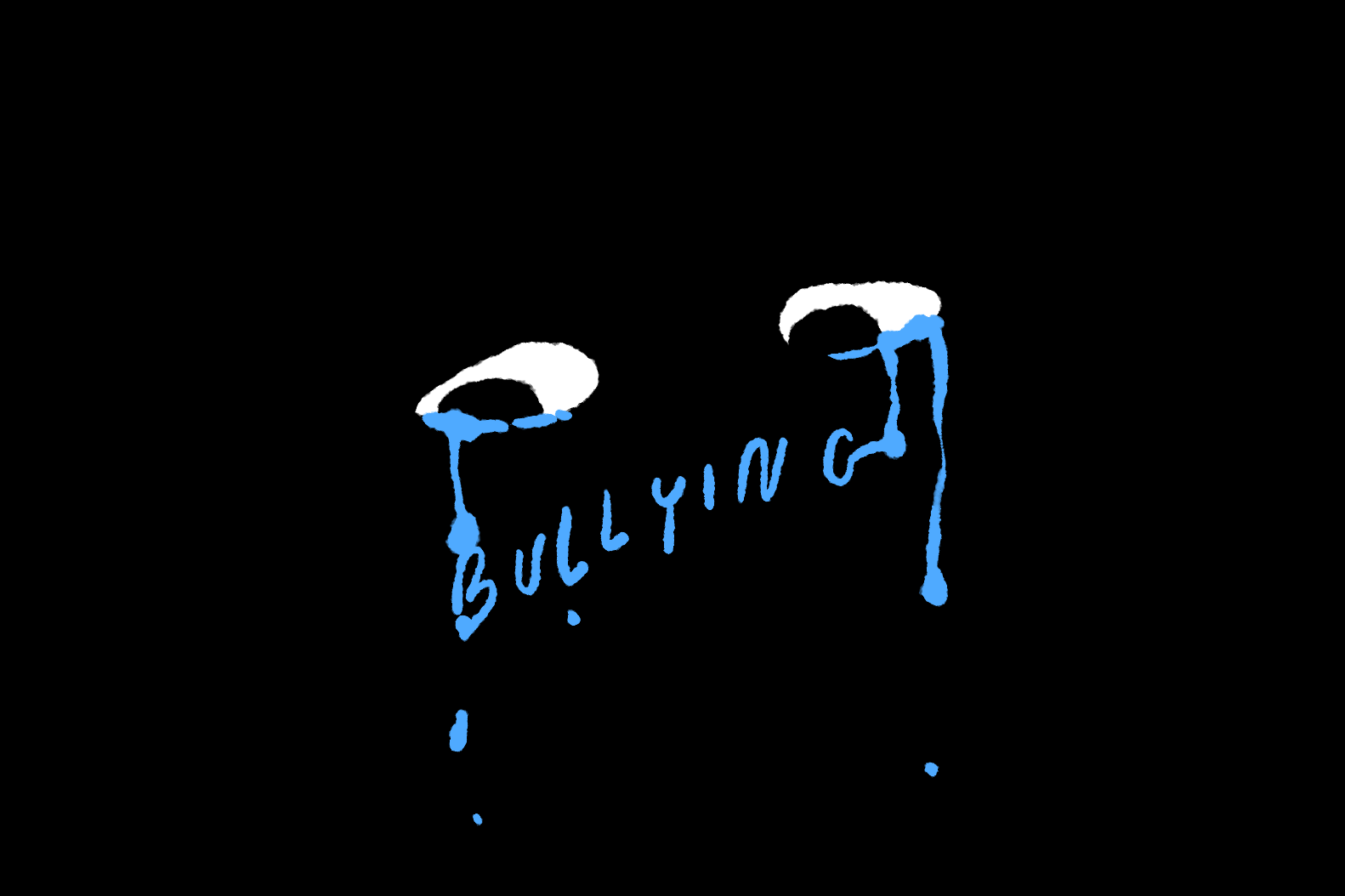From the commendable to the chao kuan (someone who doesn’t play fair), let’s take a look at the 5 common characters in any group project.
From these folks, we can learn a little about what to do and what not to do when it comes to working with others in an academic setting — and maybe even a little about excellence and managing conflict!
1. The Carry
The Carry is first in this list because they are the only one who showed up to the meeting.
Jokes aside, we’re calling this person The Carry because they’re carrying the whole team on their back and tanking everything.
Someone didn’t do the slides? The Carry will put it together before presentation. Forgot to write a few lines? The Carry already pushed those edits last night. He or she is on the ball.
One of my friends recently played this role in a group of four some weeks ago, having to pull multiple all-nighters because two of his teammates decided to put in the bare minimum (basically they exercised the NTU equivalent of NUS’ S/U option), while the other teammate didn’t speak much English. Tough.
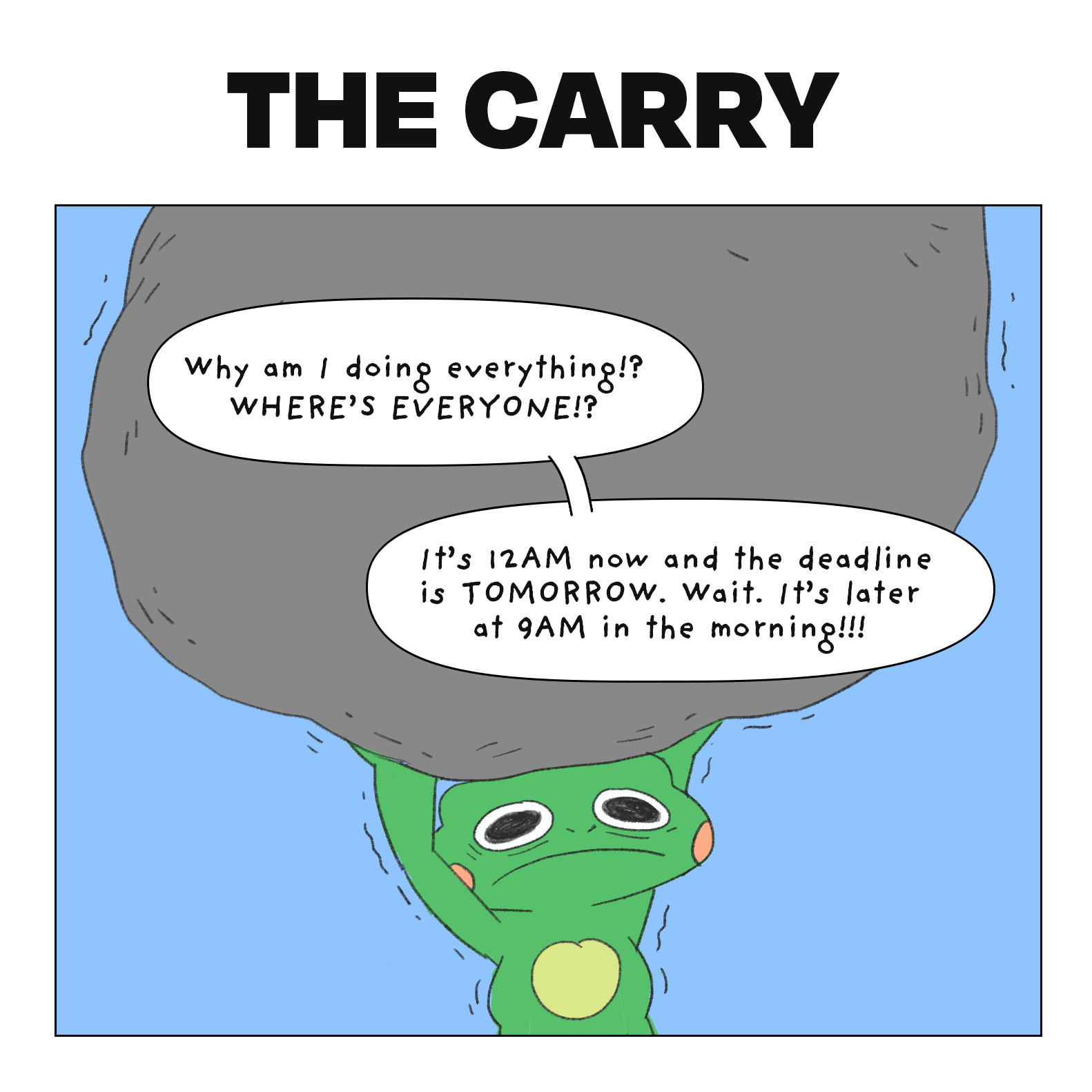
No one likes to be The Carry, but it’s still probably the best role to play in this list.
Some things you could keep in mind would be to communicate your need for assistance or your desire to see greater teamwork.
If you’re still carrying the team after conversations like that, it’s also wise to keep a record of the tasks you completed to justify a better grade when the dust settles.
It will be difficult, but it can still be a good opportunity to learn what it means to honour God in a tricky situation.
Maybe that does look like taking on more work so you can help a group member who’s really struggling in life (Acts 20:35), or stepping up in the team without grumbling or complaint.
Ask God for what He wants you to do or experience through this season. There’s something here for you — don’t miss out on discovering what that is.
2. The Carried
The Carried is the group member who either:
- Doesn’t lift a finger in the course of the project.
- Does their part but so badly that The Carry has to fix it.
Back in university, I took a coding module together with a few friends. Our last guy was someone we didn’t know — quiet and a bit of a loner — but he was quite communicative at the start.
Unfortunately, he would over-promise and under-deliver (or not deliver at all), and soon stopped attending meetings altogether.
We had a gentle conversation with him to let him know he wasn’t pulling his weight and that we would like to see him make some progress on the tasks we agreed on, but there was no change. Our team ended up having to split his workload among ourselves.
I was mad at the time, but looking back, I wonder if our teammate was going through some difficult things that made it hard for him to contribute. Life is hard, which is why I believe in giving people the benefit of the doubt.
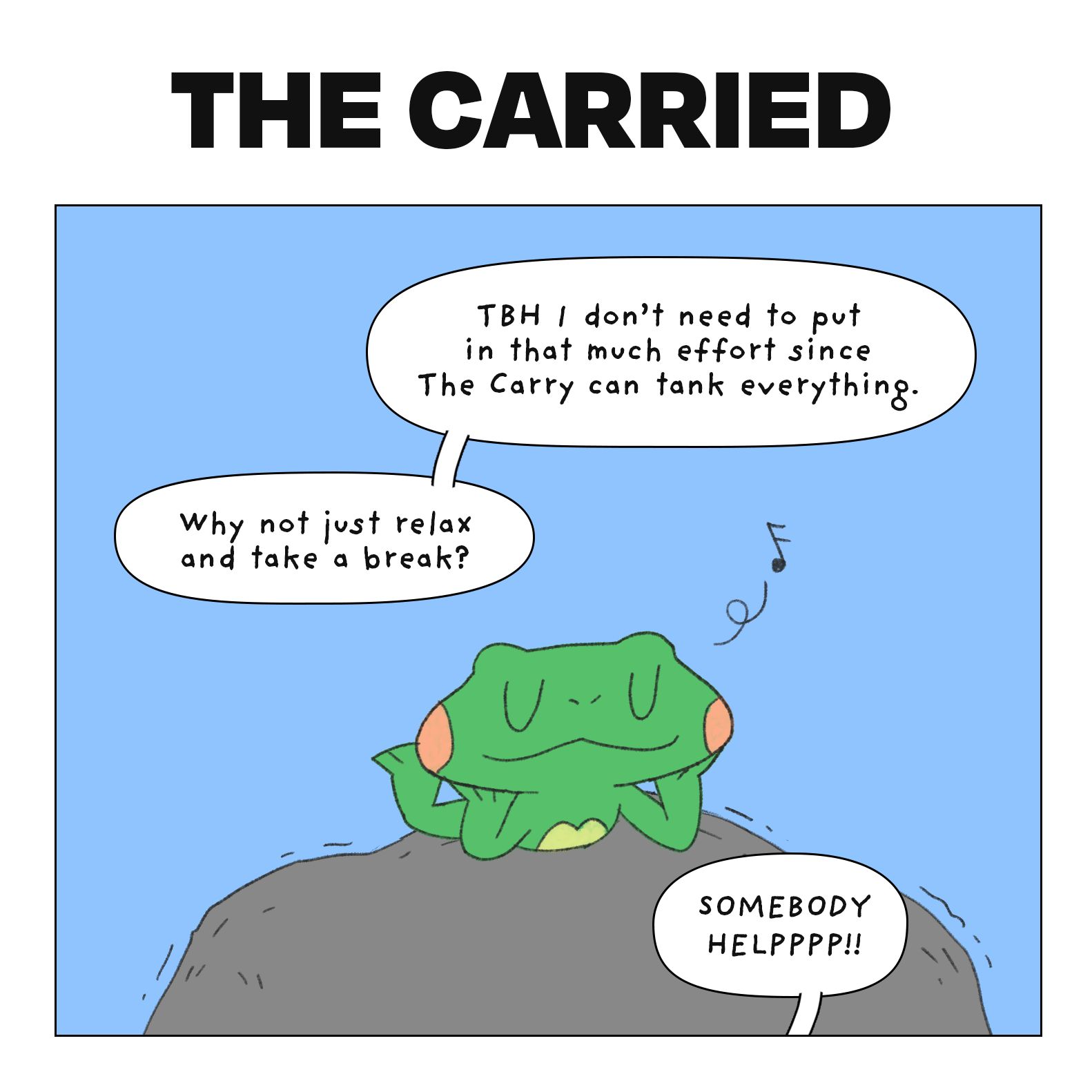
Everyone in school is busy and stressed. If you’re genuinely struggling, I think it’s okay to communicate that. And when we come across friends who are going through tough times, it’s a good chance to show God’s love (Deuteronomy 22:4).
Regardless, no one likes having The Carried in their team. Students working in teams should learn to help one another in balancing and managing workloads – that’s a key lesson in group work, after all.
What’s not okay is to say one thing and do (or don’t do) another. Entirely dropping the ball, and leaving your team to get you over the line… that’s not a great look for anyone, especially believers who represent Christ.
So if you’re being carried, it’s not too late to try and make things right. Re-engage. Apologise. Communicate. Be willing to make amends and pull your weight.
These are signs of maturity that will put you in good stead for the next task, whether solo or in a group.
3. Wayang Warrior
The Wayang Warrior is a variant of The Carried — but even worse.
The bulk of his or her energy is directed to ensuring the teacher or professor thinks they are responsible for the project’s success.
Efforts in the group setting are dedicated to cultivating the impression that they are doing a lot of things, when in fact the Wayang Warrior does precious little or even nothing at all.
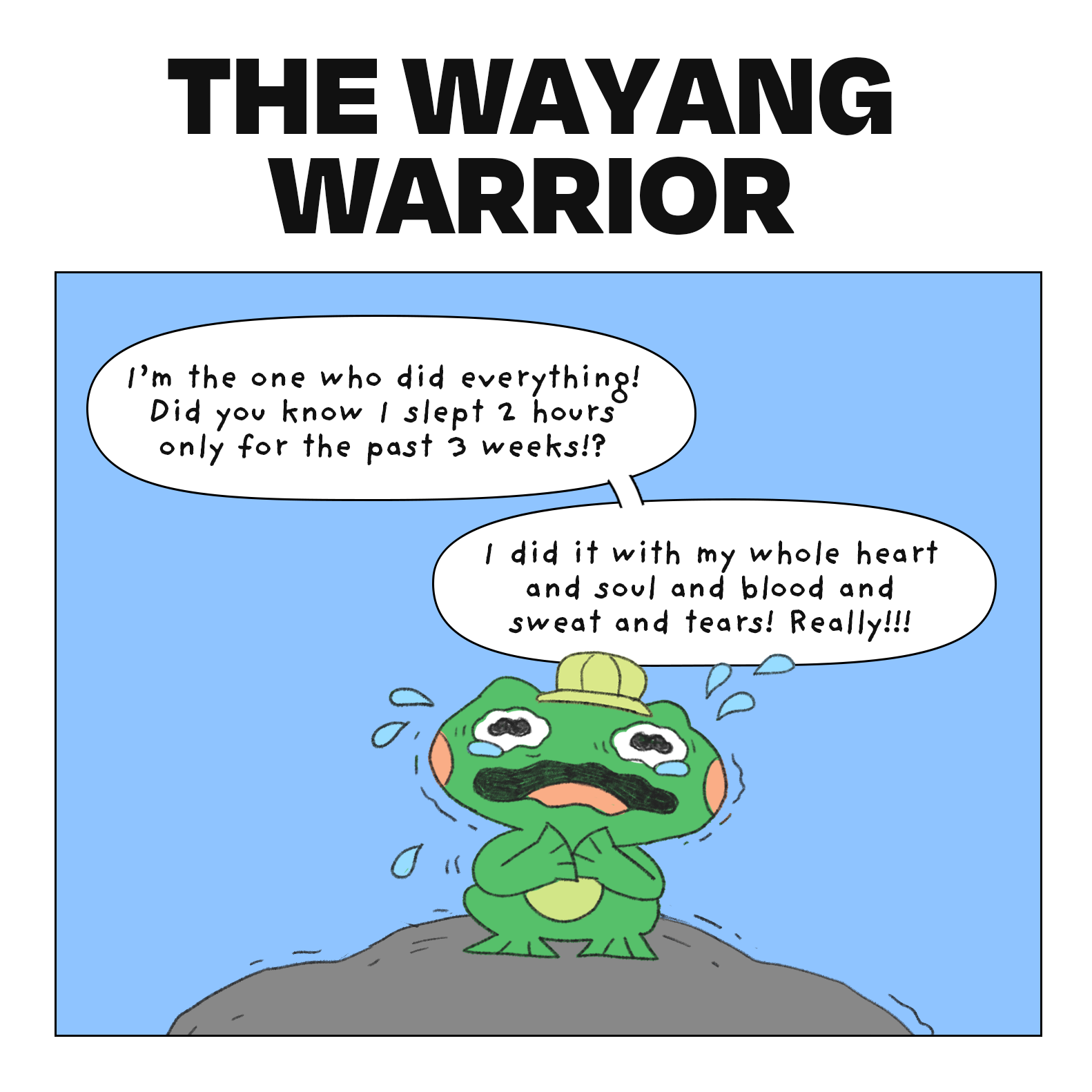
I’ve come across my fair share of Wayang Warriors, especially during National Service.
What I’ve learnt from their example is that short-term gain seems possible, but when you aren’t being true to yourself you will eventually be found out. God knows, and will allow such people to be exposed.
In a group work setting, I would seek to explore how I could apply Ephesians 5:11 with discernment. We should call it out and nip this attitude in the bud where we see it, so we don’t see wayang ways take root in the workplace and society.
Let Proverbs 12:22 guide how we behave before others: “Lying lips are an abomination to the Lord, but those who act faithfully are his delight.”
4. The Ghost
Another variation of The Carried, The Ghost is characterised by their penchant for vanishing acts.
You may not even get to see The Ghost. They don’t reply messages; sometimes they do work, sometimes they don’t. Wispy like a poltergeist, they’re hard to pin down.

One way to interact well with Ghosts is to set ground rules right at the first meeting.
Whether it’s a commitment to reply messages and questions within 24 hours, or an agreement to set aside a time for a check-in in the lead-up to a deadline, structures can be helpful in terms of creating order and regularity for more elusive teammates.
But first, believe the best of others. It’s important to remember to treat one another as people.
Beyond these tips, take some time to speak to your teammates to find out if there is a reason behind their reticence or reluctance.
Perhaps someone else in the team was behaving inappropriately, or maybe something happened in their family situation outside of project work.
We can’t know or help others out until we take the time to find out (Philippians 2:4).
If The Ghost describes you, it may be good to reconsider your working style and how it affects others.
Communicating openly and promptly is respectful, while being able to follow through on your commitments will serve you well when you become a professional in the workplace.
5. The Diva
If you have The Diva in your group, you will have drama. Grumbling, backbiting, comparisons and complaints will colour your time together.
The Diva is the teammate who insists on their way, and kicks up a fuss when things don’t go the way they think it should.
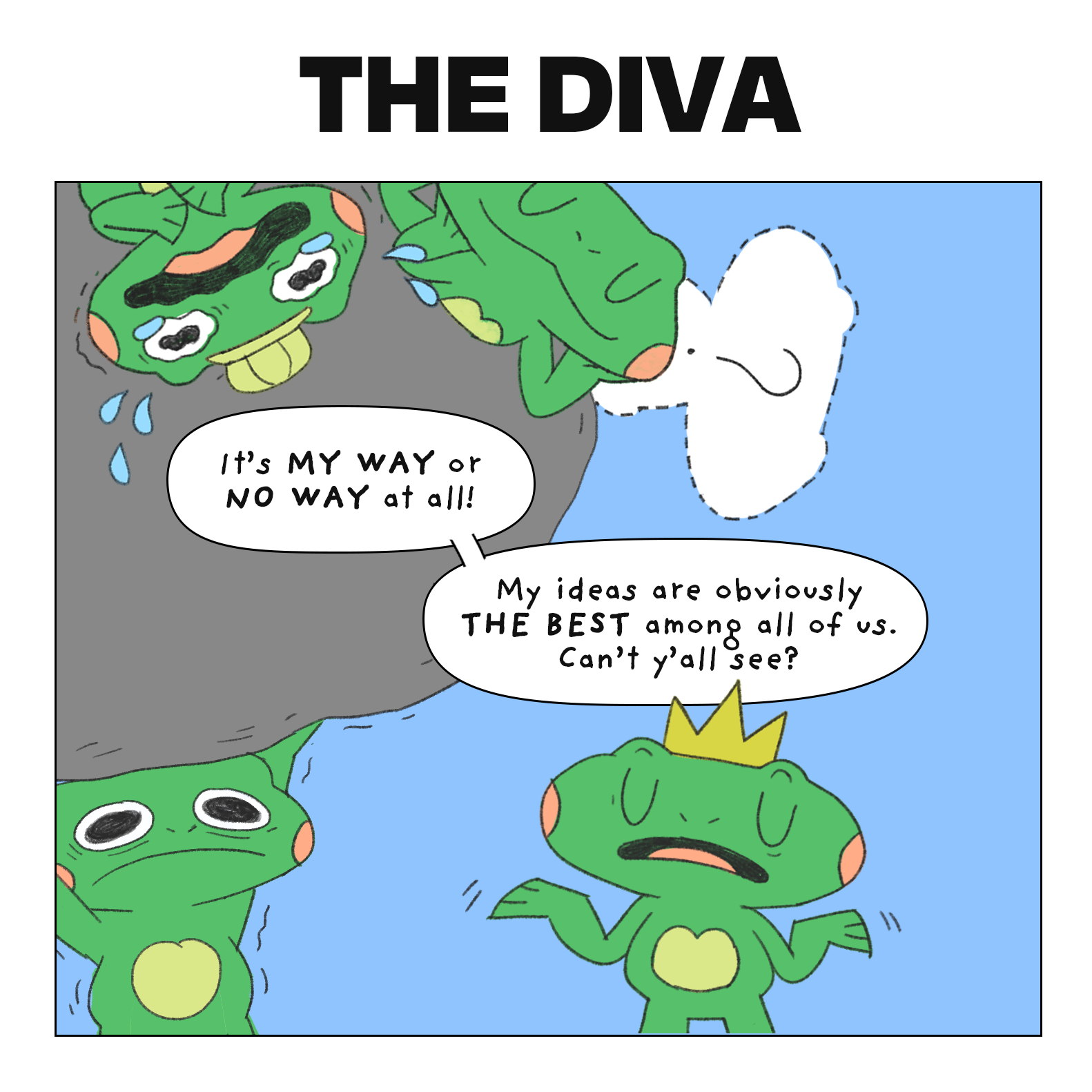
On the other hand, if drama seems to follow you wherever you go… it may be a good time to stop and self-examine. You may want to consider whether your thoughts and actions reflect Christ or cause strife.
Because the truth is that all of us are The Diva at some point or another.
That’s why we need to keep checking in with God and with one another about how we’re doing. Repent if we need to, lay down our rights if that’s necessary (1 John 3:16).
Be a peacemaker! In any team, bonding is important. It builds depth and strength in relationships, so you can lean upon it to speak the kind truth into one another’s lives.
We can’t control how other people will react or respond in life, but we ourselves can grow into people who are self-aware and people who can take hard truths from others and grow from it.
Whatever kind of person you see yourself as, learning to work well with others in a lower-stakes environment such as school is important so that when you’re in the workplace, you can be a blessing to others through the way you work.
While these stereotypes may describe how the world works, in each of them there’s a unique opportunity to counter-culturally show your teammates, groupmates or colleagues how Jesus directs your attitudes and actions.
May the fruits of those efforts display Christ, even as we share His love with those around us.
- Which character best describes you?
- What are some things you have to change or do in order to reflect Christ in a group work setting?
- How can you be a blessing to your teammates this week?









